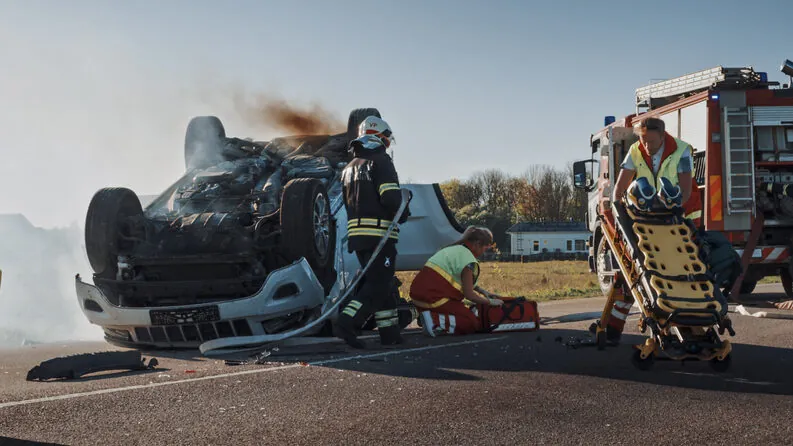
Vehicle rollover accidents can be catastrophic events, often resulting in severe personal injuries and even fatalities. Understanding the causes of these accidents is crucial for promoting road safety. In this article, we will explore the top causes of vehicle rollovers and provide valuable tips on how to avoid them. Together, we can make the roads safer.
1. High-Speed Turns:
One of the leading causes of vehicle rollovers is taking high-speed turns. When drivers approach curves or corners at excessive speeds, the centripetal force generated can overcome the vehicle’s stability. This force causes the vehicle to lean outward, potentially leading to a rollover. To avoid this, drivers should reduce their speed before entering a turn, maintain a safe speed throughout, and be mindful of the posted speed limit on winding roads, as these areas are more prone to rollover accidents.
2. Driver Behavior
Driver behavior is another significant cause of motor vehicle accidents. For example, overcorrecting a turn, abrupt steering, or sudden braking can cause the vehicle to tip over. To avoid this, drivers should always be mindful of their actions behind the wheel. Avoid distractions, such as texting or talking on the phone, and keep both hands on the wheel at all times. Additionally, drivers should avoid sudden maneuvers and always stay alert to potential hazards on the road.
3. Tripping Over Road Hazards:
Tripping over road hazards, such as curbs, medians, or soft shoulders, can cause a vehicle to rollover. The tires can catch on the obstacle, causing the vehicle to lose balance and flip over. Drivers should always stay alert, maintain proper lane positioning, and avoid sudden swerving to minimize the risk of tripping over road hazards.
4. Tire Blowouts and Loss of Traction:
Tire-related issues can contribute significantly to rollover accidents. A sudden tire blowout or loss of traction, especially in vehicles with a high center of gravity like SUVs and vans, can lead to a loss of control and a subsequent rollover. Regular tire maintenance, including proper inflation, tread checks, and regular rotations, can significantly reduce the risk of tire blowout accidents.
5. Vehicle Design
The design of the vehicle can contribute to rollover accidents. SUVs, pickup trucks, and other tall vehicles have a higher center of gravity, which makes them more prone to tipping over. As part of an industry-wide initiative to combat dangerous vehicle design and lessen the probability of drivers losing control of their vehicles, manufacturers are installing electronic stability control (ESC) in brand-new vehicles. This system helps to keep the vehicle stable during sharp turns or sudden maneuvers.
6. Overloading and Poorly Loaded Cargo:
Overloading a vehicle or improperly loading cargo can negatively impact its stability, increasing the likelihood of a rollover. It is important to adhere to the manufacturer’s weight recommendations and distribute the weight evenly within the vehicle. Additionally, securing the cargo properly can prevent shifting during sudden maneuvers and maintain the vehicle’s balance.
7. Road Conditions
Road conditions can also contribute to rollover accidents. For example, if the road is slick due to rain, snow, or ice, the vehicle can easily lose traction and tip over. To avoid this, drivers should always adjust their speed to the road conditions and avoid sudden maneuvers. Additionally, drivers should be aware of road hazards, such as potholes or debris, which can cause the vehicle to tip over.
8. Impaired Driving:
Driving under the influence of alcohol, drugs, and driver fatigue significantly impairs a driver’s ability to react and make sound judgments. Impaired drivers may be more prone to rollover accidents due to decreased coordination, slower reaction times, and poor decision-making skills. It is vital to always drive sober, well-rested, and alert to reduce the risk of rollovers and car accidents.
9. Lack of Vehicle Maintenance:
Poor vehicle maintenance can compromise the safety features that help prevent rollovers. Neglecting to check and replace worn-out brakes, suspension components, or steering systems can make a vehicle more prone to rollovers. Regular vehicle inspections, fluid checks, and timely repairs are essential to ensuring optimal performance and safety.
Key Takeaway
Vehicle rollovers can be devastating, but by understanding the top causes and taking the necessary precautions, drivers can significantly reduce the risk of these accidents. By following safe driving practices, such as reducing speeds, staying alert, properly maintaining tires, loading cargo correctly, avoiding impaired driving, and practicing regular vehicle maintenance, individuals can contribute to creating safer roads for everyone.
Contact Gonzalez & Cartwright, P.A. Today For a Free Consultation About Your Car Accident Case
At Gonzalez & Cartwright, P.A., we understand that being involved in a car accident can be a traumatic experience. Whether you have been injured due to the negligence of another driver or are struggling with the aftermath of a rollover accident, our experienced attorneys are here to help.
Our team has helped countless clients recover the compensation they deserve. We understand that every case is unique, which is why we take the time to listen to your concerns and tailor our approach to your specific needs. We will work tirelessly to build a strong case on your behalf, whether that means negotiating a fair settlement with the insurance company or taking your case to trial.
Our team of attorneys has a proven track record of success with settlements and verdicts for our clients. We have the resources and expertise to handle even the most complex cases, including those involving catastrophic injuries and wrongful death. If you have been injured in a car accident or need assistance determining the cause of your accident, don’t hesitate to contact us so that we can help you get the compensation you deserve.